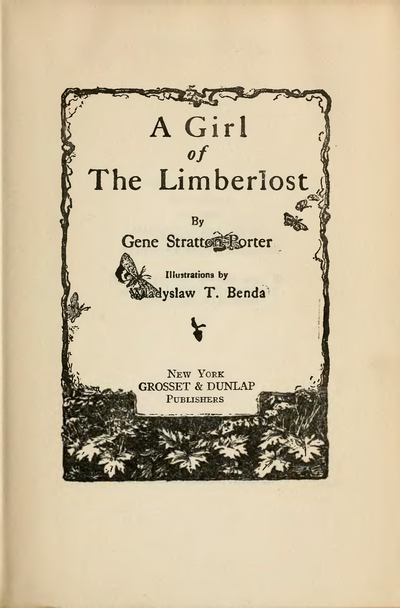Case Study 1
Jane Smith teaches a class on 20th Century American literature at a New Zealand Polytechnic. This week she is focusing on her favourite book – Gene Stratton-Porter’s 1909 novel ‘A Girl of the Limberlost’, an inspiring story of a poor girl living on the edge of an Indiana swamp. Stratton-Porter was an important novelist and nature writer up until her death in 1924, and is a deserving subject of Jane’s class.
Jane wants her students to read the novel from cover to cover, and decides to provide each one with a full copy. She has various options available to her to use as the source of the copies: Jane recently purchased an e-book edition of ‘Girl’ from a commercial e-book publisher, and also has a several printed copies – a 2013 print edition that she bought from Amazon, and her treasured 1909 first edition, signed by Stratton-Porter herself. Jane is also aware of a free copy of the text available from the Project Gutenberg website (www.gutenberg.org) set in the ASCII text format.
Jane checks the copyright status of the ‘A Girl of the Limberlost’ before making copies for her students: She discovers that in the United States all copyrights of literary works published prior to 1923 have expired. In New Zealand, copyright of a work expires 50 years after the death of the creator. Since Stratton-Porter died in 1924, the copyright expired in 1974 in New Zealand.
- Given that she wants to make copies of the book for educational purposes only, does Jane actually need to check the copyright status of the novel before making copies?
- Yes
- Correct. The educational fair-use provisions of New Zealand copyright law only allow for up to three percent of a copyrighted work to be copied. Even if her employer holds a current CLNZ educational license, this only allows 10% of the work (or a full chapter if this is greater) to be copied.
- No
- Incorrect. The educational fair-use provisions of New Zealand copyright law only allow for up to three percent of a copyrighted work to be copied. Even if her employer holds a current CLNZ educational license, this only allows 10% of the work (or a full chapter if this is greater) to be copied.
- Yes
- Which nation’s copyright law applies to Jane when deciding if copyright has elapsed on ‘A Girl of the Limberlost’?
- New Zealand, because Jane is in New Zealand
- Correct. According to the Berne Convention, the copyright law of the nation in which the copy is made applies, even if the work did not originate there
- United States, because ‘A Girl of the Limberlost’ was created there
- Incorrect. According to the Berne Convention, the copyright law of the nation in which the copy is made applies, even if the work did not originate there
- New Zealand, because Jane is in New Zealand
- Jane has four versions of 'A Girl of the Limberlost' available to copy: her 1909 printed edition, a 2013 printed edition, a 2010 commercially printed e-book, and an ASCII text version from the Project Gutenberg archive. Which versions is she legally entitled to make printed or digital copies of?
- The commercially published e-book
- Incorrect: the e-book version is probably protected by copyright due to the layout and typeface used by the publisher.
- The Project Gutenberg ASCII text version
- Partially correct. Jane could also use the 1909 printed edition as a source for copying.
- The two printed versions
- Incorrect: the 2013 print edition probably protected by copyright due to the layout and typeface used by the publisher in this revised edition.
- The 1909 print edition and the Gutenberg ASCII version
- Correct: the copyright on the text, layout and typeface of the 1909 version have all expired, while the Project Gutenberg version is a text-only version of a copyright expired work and therefore available for copying and distribution.
- The 1909 print version only
- Partly correct: the Project Gutenberg version is also able to be copied as it is a text-only version of a copyright-expired work and is therefore available for copying.
- All of them, since the copyright has expired in both New Zealand and the United States
- Incorrect. Although the copyright on the text has expired in both countries, the new editions contain new layout and typefaces, which are likely covered by an 'all rights reserved' copyright claim by the publisher.
- The commercially published e-book
